Maintenance Checklist
Here's a quick shot at what we do when you hire us for an inspection.Interior of the home
An inspection of the home’s interior should include:
- Walls, ceilings and floors
- Steps, stairways and railings
- Countertops and cabinets
- Doors and windows
- Garage doors and operators
- Installed kitchen appliances
An inspector might note whether a crack in a wall appears to be cosmetic or whether it might indicate a structural issue like a sinking foundation.
 Exterior of the home
Exterior of the home
Outside the home, inspectors typically examine:
- Wall coverings, flashing and trim
- Exterior doors
- Decks, balconies, stoops, steps, porches and railings
- Eaves, soffits and fascias visible from the ground
- Plants, grading, drainage and retaining walls
- Garages and carports
- Walkways, patios and driveways
An inspector will also examine the roof, gutters, downspouts, and any skylights, chimneys and other roof penetrations. In this part of the inspection, the home inspector will be looking for things like curled shingles that might indicate a roof is wearing out.
Plumbing
When it comes to plumbing, expect your home inspector to look at the:
- Fixtures and faucets
- Water heater
- Drain, waste and vent systems
- Sump pumps and sewage ejectors
Water Instrusion
Water intrusion is a common issue for homeowners in the Midwest. Wood rot is very common in trim and siding. The prevalence of basements in this region also makes it a hot spot for water intrusion.
Plumbing issues are also prevalent. It’s not uncommon to see water heaters serving as both a furnace and water heater. Issues arise, however, when plumbers forget to attach venting fixtures or drains when new water heaters are installed.
Electrical
The electrical inspection will include looking at:
- Service drops
- Service entrance conductors, cables and raceways
- Service equipment and main disconnects
- Service grounding
- Interior components of service panels and subpanels
- Conductors
- Overcurrent protection devices
- Light fixtures, switches and receptacles
- Circuit interrupters
The major concern here is anything that might present a fire hazard.
 HVAC
HVAC
For the home’s heating, ventilation and cooling system (HVAC), the inspector should check out:
- Access panels that can be readily opened
- Thermostats
- Installed heating and cooling equipment
- Fuel-burning fireplaces and stoves
- Vent systems, exhaust systems, flues and chimneys
- Insulation and vapor retarders in unfinished spaces
- Distribution systems
Foundation
Home inspectors may enter crawlspaces, if they have enough clearance, and attics, if the load-bearing components aren’t covered by insulation. They may examine the:
- Home’s foundation
- Floor structure
- Wall structure, ceiling structure and roof structures
What home inspectors don’t examine
The list above might seem comprehensive, but there are many things that home inspectors aren’t required to look at. These include systems and components that aren’t readily accessible.
A home inspector won’t peel up the carpet to see if there are cracks in the foundation, nor will he cut a hole in the bathroom wall to look for hidden mold or rusty pipes.
They don’t have to move furniture, plants, snow, ice or debris that might be in the way, so try not to buy a house in the winter if you want the roof examined. Inspectors also won’t do anything that might damage the property or pose a danger to themselves, including entering crawl spaces or attics that are too tight, walking on the roof or lighting a fire in a fireplace.
In addition, inspectors need not try to guess how much life is left in the home’s air conditioner, furnace, roof, dishwasher or other systems and components. If they note something that isn’t working, they don’t have to attempt to diagnose the cause or estimate the cost to fix it, nor will they try to estimate the cost of your monthly utility bills.
They also don’t have to operate underground systems, such as lawn irrigation systems or underground storage tanks.
Inspectors don’t check for termites or other wood-destroying insects, nor do they test for environmental hazards like radon or asbestos (though some inspectors offer additional testing as an add-on service—yes, we do!).
And they don’t have to test smoke detectors, every single light switch and fixture in the home (only a representative number) or appliances that aren’t permanently installed, such as window air conditioning units.
Don’t expect them to weigh in on whether you should proceed with the purchase, either. And if you’re buying a condo unit, they won’t inspect the building’s common areas.
